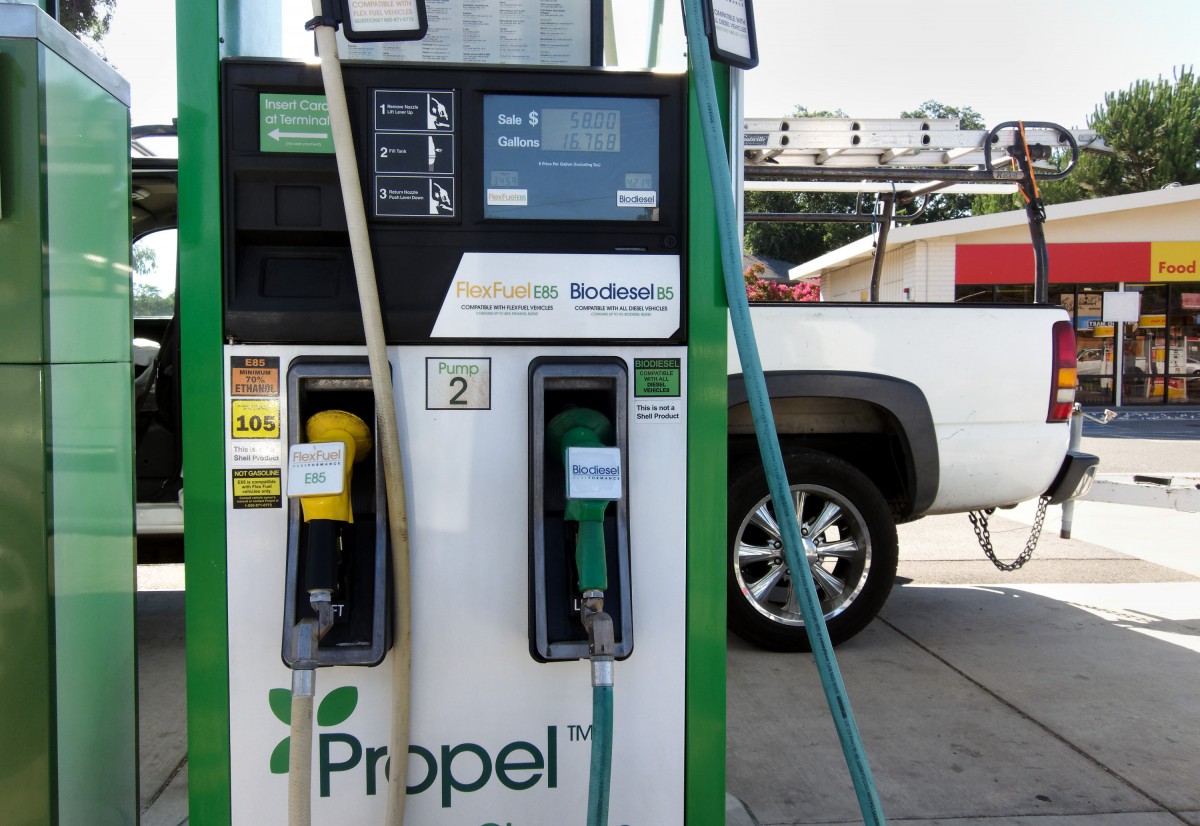Diesel is what keeps many vehicles rolling. But there’s another eco-friendly alternative making waves: biodiesel. Made from domestic crops like soy, it burns cleaner than the diesel fuel.
Is there any other difference between biodiesel vs diesel? We’ll explore both fuels side by side so you can decide which one is the better option.
Contents
What Is Diesel Fuel?
Diesel fuel keeps big trucks and machines running strong. It’s made from crude oil through a process called fractional distillation.
The process involves heating up the crude oil and separating it into different liquid fuels based on their boiling points. One of those liquids is diesel.
Diesel is a bit thicker than gasoline. Instead of a spark plug, diesel engines rely on high compression to ignite the fuel. The pressure squeezes the diesel so tightly that it bursts into flames all on its own.
This fuel type packs more energy than gas too. That’s why it’s better for bigger vehicles that haul heavy loads for long distances. It’s also pricier than gasoline.
What Is Biodiesel Fuel?
Have you heard of biodiesel? It’s basically a renewable version of regular diesel made from vegetable oils and animal fats.
Biodiesel is produced through a process called transesterification. In this process, oils from sources like soybeans or canola are transformed into a clean-burning fuel.
The best part is it can be used just like regular diesel. Many vehicles can run on a biodiesel-petrodiesel blend without any modifications. Making biodiesel is helping cut back on pollution too. It produces less emissions and is biodegradable, so no harm if any spills.

Comparison Between Biodiesel vs Diesel
Diesel and biodiesel represent two distinct fuel types with varying environmental effects and performance attributes. We’ll compare them across their sources, emissions, and impact on engines.
1. Energy Content
Diesel produces more power per gallon than biodiesel. Its energy density is a bit higher since it’s made from crude oil. So, your truck might get a little further on a tank of regular diesel. But the difference isn’t huge, especially with smaller biodiesel blends.
You may see one or two less miles to the gallon with a B20 blend compared to straight diesel. But the range is only reduced by a few percent. As long as you’re using high-quality biodiesel from a trusted supplier, you shouldn’t have issues.
2. Cost and Infrastructure
Biodiesel typically costs more than regular diesel. It currently sells for 70% to 130% more than diesel and petrol fuels.
Distribution is another downside because not every fueling station carries biodiesel yet. But the numbers are expanding steadily. Larger chains are jumping on board as consumer demand rises.
SEE MORE
- The Pros and Cons of Biodiesel Energy
- 5 Easy Ways to Identify between Petrol Cars and Diesel Cars
3. Vehicle Compatibility
The great thing about biodiesel is you don’t need any special vehicles to use it. Pretty much all diesel engines, old and new, can run just fine on biodiesel/petrodiesel blends up to B20.
As long as you properly maintain your fuel filters, there shouldn’t be any performance issues. The extra lubrication biodiesel provides is actually easier on moving parts in the long run.
4. Impacts on Performance
With trucks and heavy equipment, power and performance are important. So how does biodiesel stack up compared to regular old diesel?
At lower blends like B5 or B20, you really shouldn’t notice much difference in how your car handles. But at the highest biodiesel blend levels, you might start to feel a slight dip in power output. Now we’re talking blends above B50 here that contain 50% biodiesel. And honestly, most vehicles aren’t using fuel that is biodiesel-heavy anyway.
The reason some see impacts at very high blend levels goes back to energy density. Diesel simply packs more BTUs into each gallon compared to biodiesel. So, with a B50 tank for example, you may end up with slightly less torque and acceleration versus a straight petrodiesel.
5. Handling and Storage
Comparing biodiesel vs diesel, the former has some distinct perks regarding handling and storage. Its flash point is way higher than regular diesel, meaning it’s less likely to combust if it accidentally ignites. That’s important for safety.
However, biodiesel can gel up if it gets too cold. So, you must store it in a heated garage over winter.
6. Emissions
There is a big difference in the emissions biodiesel vs diesel puts out. When you fill up with biodiesel, you can feel good knowing it’s easier on the environment. According to the EPA, it produces around 11% less carbon monoxide and 10% less particles than petrodiesel.
Since biodiesel is made from plants that absorb carbon dioxide as they grow, it creates a lot less net CO2 too. Studies show producing and burning biodiesel results in 78% fewer greenhouse gas emissions versus diesel. That’s a huge reduction. Biodiesel emissions are also non-toxic, so if you do spill some it won’t poison the ground.
7. Other Environmental Impacts
Biodiesel production does require lots of cropland and water to grow the plants it’s made from. So, it does have some impact in this regard. But the main crop is soy, a versatile plant already widely grown. And making biodiesel creates zero toxic byproducts like diesel refinement does.



